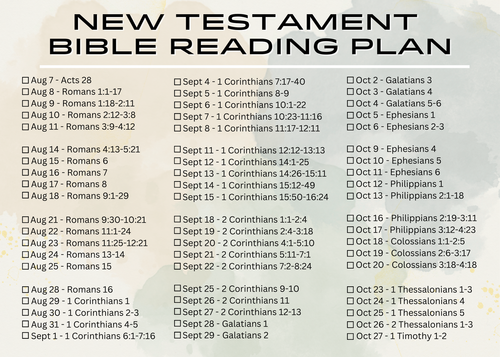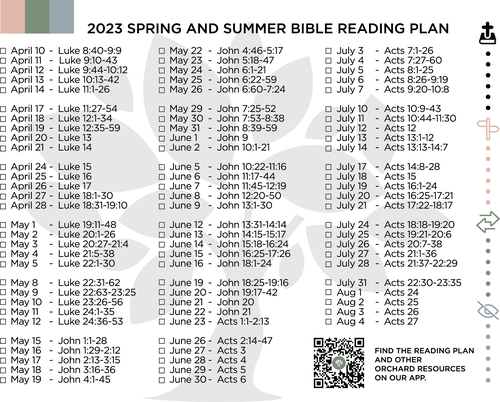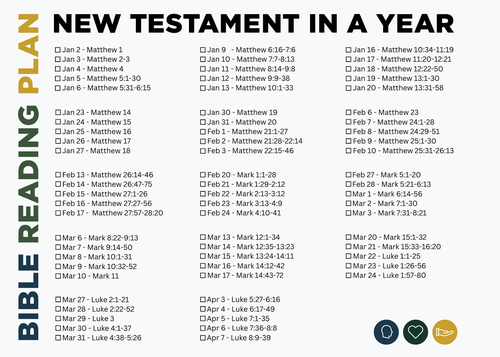Heirs According To The Promise
Galatians 3:1-29
Paul once again addresses the Galatians directly, expressing concern over their fascination with false teachers. He wants them to realize that their behavior is irrational when measured against the gospel of Christ crucified. God Himself confirmed their inclusion in His people by granting them the Spirit when they heard and believed the gospel, without any requirement of following the law. The false teaching represents a regressive step from the empowering, sin-conquering gift of God's Spirit to the weakness of relying on "the flesh."
Their inclusion into the people of God through faith fulfilled God's promises to Abraham. Abraham's righteousness was credited to him as a gift, not because of his actions. Just as Abraham was justified by faith alone, others would also be justified by faith alone, fulfilling God's promise to make him the father of many nations. The blessing to all nations through Abraham comes through their faith, not adherence to the Mosaic law. These believing Gentiles, while remaining Gentiles, are also justified by faith, like Abraham, and are blessed "in" him.
Paul argues that viewing obedience to the Mosaic law as a means to receive blessings is a futile endeavor. Although it may seem feasible to adhere to God's law (Deut. 30:11–14), no one has ever fully obeyed it. Thus, apart from God's saving mercy, everyone remains under the curse of the law. God's original intention was not for people to obtain life through the law. In support of this, Paul quotes Habakkuk 2:4 to emphasize that Scripture teaches that those who are justified by faith will truly live.
The provision made by God for rescuing people from the curse of the law, which is imposed on those who have disobeyed it, is through the substitutionary death of Christ on the cross. By enduring the curse in place of believers, Christ was able to redeem them from the curse of the law. When Jesus died on the cross, his death served as a substitution for their own death. Paul refers to a line in the Mosaic law (Deuteronomy 21:23) that describes anyone hung on a tree as cursed, and it is this curse that Jesus absorbed through his atoning death.
In order to fulfill his promise to Abraham, God intended to bless "all the nations" through him and pour out his Spirit on Israel and all people during Israel's future restoration. The fulfillment of God's covenantal promise to Abraham is found in Christ and takes precedence over the Mosaic covenant. God promised to bless all the nations and the entire earth through Abraham and his descendants.
Paul then takes a further step by noting that the term "offspring" is singular, not plural. He connects the fulfillment of God's promises to Abraham with Christ. The promise to Abraham and his seed, that they would inherit the earth and bless many nations, cannot be fulfilled through the Mosaic law, which is specific to ethnicity and nationality. If Gentiles are required to adopt the Mosaic law, they essentially become Jews, and the blessing of Abraham does not extend to the nations (3:14).
This raises the question of why God gave the law. According to Paul, the law had a temporary purpose, distinct from the Abrahamic covenant. It made God's will explicit, highlighting human disobedience. The law governed God's people until "the offspring" arrived. The use of angels as intermediaries further confirms its temporary and subordinate nature.
The law is a reflection of God's will, but people are unable to fully adhere to it. It was designed to highlight the presence of sin within the Abrahamic covenant. Paul transitions from referring to the "law" to referring to the "Scripture," possibly to underscore that the law, like all of Scripture, is God's Word and represents His intentions.
A "guardian" was a slave employed by wealthy families to care for their children, provide education and moral guidance, and ensure their safety. While some children later appreciated their guardians, Paul likely considers the temporary role of a guardian and the negative portrayal of this figure in Greco-Roman society. However, as young adults outgrow the need for strict caretakers, those who embrace the gospel mature beyond reliance on the law.
The Gentile Galatian believers are no longer bound by the law because they are "in Christ Jesus" and considered "sons of God" (v. 26). This transformation happened when they heard and believed the gospel, uniting them with Christ. Paul emphasizes the baptism of the Galatian believers "into Christ." The previous divisions among people have been abolished for those who believe (cf. Eph. 2:13–18). Being united with Christ also makes the Galatians "offspring" or "descendants" of Abraham, making them heirs of the promise God made to Abraham and his descendants. This includes the inheritance of "the earth."
Their inclusion into the people of God through faith fulfilled God's promises to Abraham. Abraham's righteousness was credited to him as a gift, not because of his actions. Just as Abraham was justified by faith alone, others would also be justified by faith alone, fulfilling God's promise to make him the father of many nations. The blessing to all nations through Abraham comes through their faith, not adherence to the Mosaic law. These believing Gentiles, while remaining Gentiles, are also justified by faith, like Abraham, and are blessed "in" him.
Paul argues that viewing obedience to the Mosaic law as a means to receive blessings is a futile endeavor. Although it may seem feasible to adhere to God's law (Deut. 30:11–14), no one has ever fully obeyed it. Thus, apart from God's saving mercy, everyone remains under the curse of the law. God's original intention was not for people to obtain life through the law. In support of this, Paul quotes Habakkuk 2:4 to emphasize that Scripture teaches that those who are justified by faith will truly live.
The provision made by God for rescuing people from the curse of the law, which is imposed on those who have disobeyed it, is through the substitutionary death of Christ on the cross. By enduring the curse in place of believers, Christ was able to redeem them from the curse of the law. When Jesus died on the cross, his death served as a substitution for their own death. Paul refers to a line in the Mosaic law (Deuteronomy 21:23) that describes anyone hung on a tree as cursed, and it is this curse that Jesus absorbed through his atoning death.
In order to fulfill his promise to Abraham, God intended to bless "all the nations" through him and pour out his Spirit on Israel and all people during Israel's future restoration. The fulfillment of God's covenantal promise to Abraham is found in Christ and takes precedence over the Mosaic covenant. God promised to bless all the nations and the entire earth through Abraham and his descendants.
Paul then takes a further step by noting that the term "offspring" is singular, not plural. He connects the fulfillment of God's promises to Abraham with Christ. The promise to Abraham and his seed, that they would inherit the earth and bless many nations, cannot be fulfilled through the Mosaic law, which is specific to ethnicity and nationality. If Gentiles are required to adopt the Mosaic law, they essentially become Jews, and the blessing of Abraham does not extend to the nations (3:14).
This raises the question of why God gave the law. According to Paul, the law had a temporary purpose, distinct from the Abrahamic covenant. It made God's will explicit, highlighting human disobedience. The law governed God's people until "the offspring" arrived. The use of angels as intermediaries further confirms its temporary and subordinate nature.
The law is a reflection of God's will, but people are unable to fully adhere to it. It was designed to highlight the presence of sin within the Abrahamic covenant. Paul transitions from referring to the "law" to referring to the "Scripture," possibly to underscore that the law, like all of Scripture, is God's Word and represents His intentions.
A "guardian" was a slave employed by wealthy families to care for their children, provide education and moral guidance, and ensure their safety. While some children later appreciated their guardians, Paul likely considers the temporary role of a guardian and the negative portrayal of this figure in Greco-Roman society. However, as young adults outgrow the need for strict caretakers, those who embrace the gospel mature beyond reliance on the law.
The Gentile Galatian believers are no longer bound by the law because they are "in Christ Jesus" and considered "sons of God" (v. 26). This transformation happened when they heard and believed the gospel, uniting them with Christ. Paul emphasizes the baptism of the Galatian believers "into Christ." The previous divisions among people have been abolished for those who believe (cf. Eph. 2:13–18). Being united with Christ also makes the Galatians "offspring" or "descendants" of Abraham, making them heirs of the promise God made to Abraham and his descendants. This includes the inheritance of "the earth."





Recent
Archive
2023
January
Happy New Year!He Will Save His People From Their SinsMy Beloved SonTemptation And MinistryThe SermonLeaving, Lying, Limits, Love, Largesse, and The Lord's PrayerTreasure, Anxiety, and JudgmentAstonishing AuthorityStorms, Demons, and HealingJesus Is CompassionateHis Eye Is On The SparrowSwords, Rewards, and MessengersThe Lord of the SabbathBlasphemy, Bad Trees, Signs, and FamilyStories, Sowers, and SoilsParables, Hidden Treasure, and RejectionFame, Food, Fear, Faith, and FringeReal Issues And The Power Of GodDying To Find LifeLike The SunChildren, Temptation, Sheep, And ForgivenessMarriage, Kids, And MoneyTo Serve And Give His Life
February
The ArrivalStories That StingQuestion TrapsHidden Motives And LamentThe End...?UnexpectedReady?Punishment, The Plot, And PerfumeTreachery, Passover, and The CupBetrayal, Injustice, And DenialThe Field Of Blood And The GovernorCrucifixion And DeathAll AuthorityMark—The Beginning Of The GospelHealing, Preaching, And The Forgiveness Of SinEating With Tax Collectors, Fasting, The Sabbath, And An Escape BoatThe Twelve, Blasphemy, Family, And A ParableParables And PowerA Different Kind Of StormPower Had Gone Out
March
Death, Hunger, And MiraclesCommandment Or TraditionDo You Not Yet Understand?The Christ And A Glimpse Of His GloryUnbelief, Confusion, And SinDivorce, Children, And PossessionsTo Give His Life As A RansomHosannaThe Rejected Stone, Taxes, And The Great CommandmentDestruction And The EndNo One Knows, An Anointing, And A Promise To BetrayPassover And GethsemaneThe Kiss, Arrest, And DenialPilate, Simon, And The CrucifixionDeath, Burial, Resurrection, And What\'s NextTheophilus And A Visit From GabrielMary And The MagnificatBenedictusThe Arrival And The ShepherdsSimeon, Anna, And The SpiritFruits Keeping With Repentance And BaptismThe Wilderness, Nazareth, And CapernaumSimon's Mother-In-Law, Fishing, A Leper, And Sins
April
Tax Collectors, Fasting, Sabbath Controversies, And The TwelveWhy Do You Call Me Lord, Lord?Jesus Marveled, A Raised Son, And QuestionsA Sinful Woman And A ParableObeying The Word, A Storm, And DemonsTwelve Years, Twelve Apostles, And SpeculationGreater, Costly, And GloryNot Getting It, The Cost, And AppointedWoes, Neighbors, And What Is NecessaryHelp Us Pray And A Divided Kingdom?Signs, Lights, And WoesHypocrisy, Fear, A Fool, And AnxietyParables, Division, And The TimesWarnings, A Daughter Of Abraham, And Jerusalem, JerusalemA Son Or An Ox, Parties, And DiscipleshipLost ThingsThe Dishonest Manager, The Law, And Anguish In This FlameMillstones And Mustard SeedsPersistent Prayer, Humility, A Childlike Faith, And The Rich RulerEverything That Is Written, A Blind Beggar, And A Wee Little Man
May
A Parable, A Colt, A Prophecy, And A CleansingAuthority, Wicked Tenants, And TaxesThings To Beware Of And WidowsDestruction, Persecution, The Son Of Man, And WatchingThe Plot, Betrayal, Lord's Supper, And Inappropriate BehaviorPrediction, Fulfillment, Agony, Betrayal, And DenialMistreated, Taken Before The Council, Pilate, Herod, And Delivered To Be CrucifiedCrucifixion, Death, And BurialHe Is Not HereDisbelieved For JoyIn The Beginning…The Lamb Of God And A WeddingZeal, What's Inside, And Born AgainHe Must Increase
Categories
no categories
Tags
no tags
